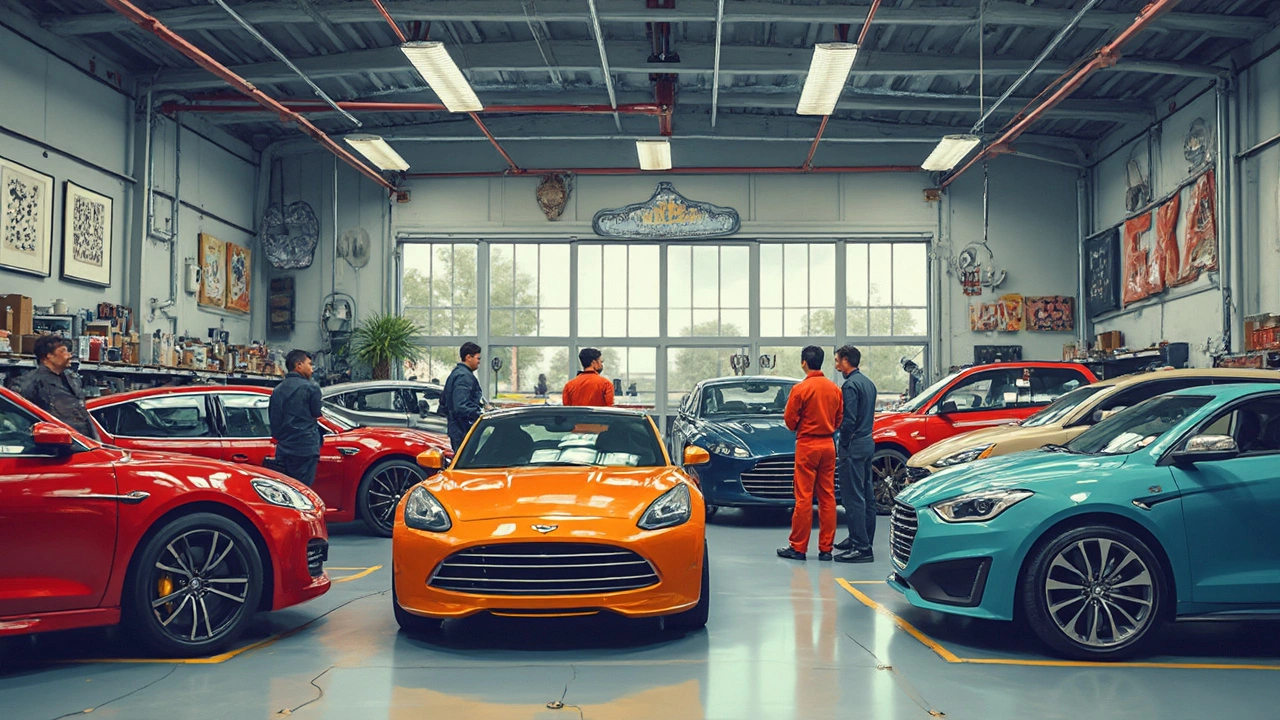Wondering if alloy wheels are breaking the bank? It's a question many car owners ponder when considering this stylish upgrade. Sure, they can be a bit pricier than your standard steel wheels, but they pack a punch in more ways than one.
First off, let's break down why they can cost a pretty penny. The materials used—aluminum mostly, sometimes mixed with other metals—aren't cheap. Plus, the manufacturing process is more complex, making them more of an investment. But hang on, it’s not just about the materials. Brand reputation, the size of the wheel, and even the design can all tip the scale on the final price tag.
But here's the kicker: alloy wheels aren't just about looks. They improve performance too. They're lighter than their steel counterparts, which can help with fuel efficiency and even braking. Plus, they dissipate heat better, which is a boon for your brakes. So, while the initial outlay might be steeper, there are perks that might make it worth your while in the long run.
- Understanding Alloy Wheels
- Factors Influencing Costs
- Benefits of Alloy Wheels
- Comparing Alloy with Steel Wheels
- Tips for Buying Alloy Wheels
Understanding Alloy Wheels
At the heart of many a sleek car design lie alloy wheels. But what exactly are they, and why do they matter so much?
Alloy wheels are made from a blend of aluminum and other metals. The use of aluminum makes them lighter but also stronger compared to traditional steel wheels. This weight difference is a big deal because lighter wheels mean better performance in terms of acceleration, braking, and even fuel efficiency.
How They're Made
The process of making these wheels involves casting or forging, which strengthens the metal and shapes it into the desired form. Cast wheels are made by pouring molten aluminum into a mold, while forged wheels are created by applying pressure to shape the aluminum under extreme heat. Forging usually results in stronger but also more expensive wheels.
Why Choose Alloy?
- Performance Boost: Thanks to their lighter weight, they reduce unsprung mass, which enhances handling and ride quality.
- Better Heat Conductivity: Alloy wheels dissipate heat more effectively, which helps keep the brakes cooler and can improve braking performance.
- Stylish Designs: They offer a wider range of designs and finishes, making them a favorite for those wanting to customize their car’s appearance.
Some Quick Numbers
To give you an idea of their prevalence, consider this: 60% of new cars in 2023 were equipped with alloy wheels from the start. It speaks volumes about their growing acceptance and popularity among automakers and consumers alike.
In a nutshell, alloy wheels strike a balance between performance benefits and aesthetic appeal. Despite their higher costs, many drivers see them as a worthy investment. When choosing wheels, the key is to understand your priorities and what you value most in your driving experience.
Factors Influencing Costs
Alloy wheels are known for their sleek design and added performance benefits, but the big question is: why do they often cost more than steel wheels? Plenty of factors play into this.
Materials and Manufacturing
The core of why alloy wheels can be expensive boils down to the materials. Made predominantly from aluminum, sometimes with added metals for strength and flexibility, they require a more sophisticated production process compared to steel wheels. This intricacy in manufacturing doesn't come cheap.
Brand Name and Reputation
Brands, just like in fashion, play a significant role in pricing. Well-known brands like BBS or OZ Racing can cost you more purely because of their reputation and the guarantee of quality they bring with their name. So, if you're eyeing a brand with a solid track record, be prepared to spend a bit extra.
Size Matters
The size of the wheel affects the price too. Larger wheels require more material and often command a higher price. A big wheel not only looks cool but also impacts your car's handling, which again might justify the additional expense.
Design Features
The more intricate the design, the higher the cost. Simple maths, right? Wheels with unique patterns and custom designs demand higher craftsmanship and resources, translating to a steeper price tag.
Finish Options
There's a spectrum of finishes available for alloy wheels, from polished and painted to more expensive chrome. These finishes offer different aesthetics and durability, influencing the overall price.
With these factors in mind, you'll get a clearer picture of what contributes to the cost of alloy wheels and why they’re considered an investment for your vehicle.

Benefits of Alloy Wheels
Alloy wheels offer several compelling advantages beyond just their sleek appearance. Let's dig into why so many drivers are willing to spend extra for these popular upgrades.
Improved Performance
One of the standout benefits of alloy wheels is their ability to enhance vehicle performance. They're generally lighter than traditional steel wheels, which means reduced unsprung weight. This reduction helps in better handling, improved acceleration, and more responsive braking.
Fuel Efficiency
Lighter wheels mean less energy is needed to move them, leading to potentially better fuel efficiency. In these times of fluctuating fuel prices, every bit of efficiency can make a difference in your pocket.
Enhanced Heat Dissipation
Alloy materials dissipate heat more effectively compared to steel. This quality can benefit the braking system by preventing overheating and maintaining optimum brake performance, especially during long drives or frequent stops.
Corrosion Resistance
Alloy wheels typically resist rust and corrosion better than their steel counterparts. This resilience can make them last longer and maintain their shiny appearance, even in harsh weather conditions.
Customization and Style
On the aesthetic side, alloy wheels are available in a plethora of designs, finishes, and sizes. This variety allows car enthusiasts to personalize their ride and make a statement on the road.
- Polished, painted, or machined finishes offer diverse customization options.
- Multiple spoke designs can match different vehicle styles and personalities.
- Choose from various sizes to get the perfect fit for your vehicle type.
To sum up, while alloy wheels might cost more upfront, their combination of performance perks, fuel-saving potential, and visual appeal can make them a worthy investment for many drivers.
Comparing Alloy with Steel Wheels
When you're shopping for wheels, the classic debate is whether to go for alloy wheels or stick with steel wheels. It’s a decision that hinges on what you value more: performance or cost.
Weight Matters
First up, let's talk about weight. Alloy wheels are definitely the lighter option here. This might not seem like a big deal, but shedding a few pounds can boost your car's performance. Lighter wheels mean better handling, quicker acceleration, and improved fuel efficiency. On the flip side, steel wheels are heavier and can make the car feel a bit sluggish when driving.
Design and Looks
Then there’s the aesthetic factor. Alloy wheels come in various designs that can really make your car stand out. If you're someone who likes a bit of flair, alloys are definitely the way to go. Steel wheels tend to be more basic and are often covered with hubcaps to make them look a little more snazzy.
Durability and Maintenance
Steel wheels, hands down, win the durability contest. These bad boys are tough and can take a beating from potholes without flinching. Alloy wheels, while strong, tend to crack if you hit something hard. They also need a bit more TLC since scratches and dents are more noticeable.
"The choice between alloy and steel wheels often comes down to personal preference and how much you're willing to invest. It’s important to weigh performance benefits against cost," says Jamie Adkins, an auto industry expert.
Cost Factors
With all that said, let's not ignore the price tag. Steel wheels are usually cheaper, making them great for anyone on a budget. Alloy wheels will cost you more, but they offer benefits that might justify the expense for some. They’re the priciest upgrade that gives both performance and style boosts.
| Aspect | Alloy Wheels | Steel Wheels |
|---|---|---|
| Weight | Lighter | Heavier |
| Design Flexibility | High | Low |
| Durability | Moderate | High |
| Price | Higher | Lower |
So there you have it, the lowdown on alloy wheels versus steel wheels. The choice hinges on what you prioritize: a sleek look and performance or rugged durability and a friendly price tag.

Tips for Buying Alloy Wheels
So, you’ve decided to splurge on a set of alloy wheels. Great choice, but before you swipe that credit card, there’s a few things to consider to ensure you’re getting the best bang for your buck.
1. Know Your Car’s Specs
Before you fall for those snazzy wheels, make sure they’re a fit for your car. Check the wheel size, bolt pattern, and offset—these specs have to match your vehicle. Misfit wheels can lead to handling issues, and nobody wants that.
2. Decide on a Budget
It's easy to get carried away with all the shiny designs out there. Set a clear budget that factors in not just the wheel cost but also installation and any potential modifications. Remember, alloy wheels come in a wide price range, so it's crucial to know your limit.
3. Material Quality Matters
Alloys are made from different compositions and getting one with good quality can impact durability and performance. Look for reputable brands known for durability and quality craftsmanship to ensure safety and longevity.
4. Consider the Finish
The finish is more than just aesthetics. Chrome, polished, or painted finishes each have pros and cons in terms of maintenance and durability. If you live in an area with harsh winters, you might want a finish that can withstand the elements.
5. Don't Forget About Tires
When buying new alloy wheels, remember you might need new tires too. Wheels and tires go hand-in-hand, and your current tires might not fit the new rims.
6. Where to Shop
- Specialized Wheel Shops: Experts in wheels and can offer tailored advice.
- Online Retailers: Often cheaper but ensure you’re buying from a trusted source.
- Local Dealerships: They might offer a fitting service to ensure compatibility.
In the end, picking the right set involves a balance of style, performance needs, and budget. Take your time, and those new wheels will transform your car without a hitch.






